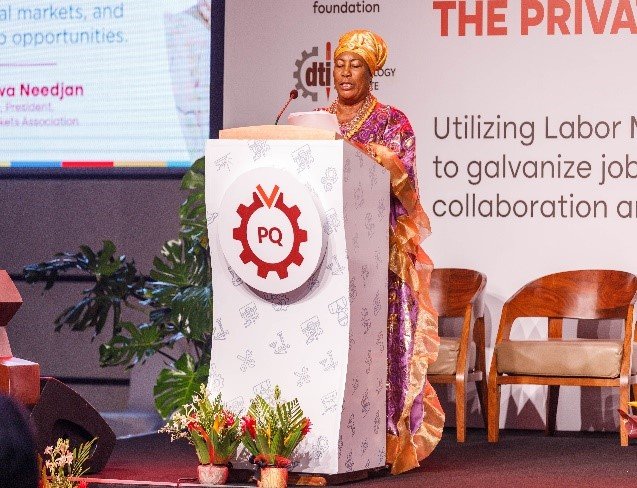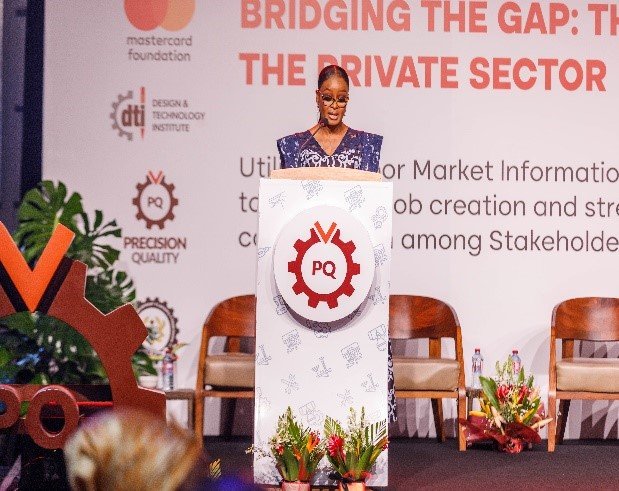
Mercy Afrowa Needjan, GAMA President

The President of the Greater Accra Markets Association (GAMA), Mercy Afrowa Needjan, has called on stakeholders to strengthen collaborations with the agricultural sector to revitalise Ghana’s markets, enhance competition in the local and international markets, and create sustainable jobs.
She was speaking at the 4th annual National Precision Quality (PQ) Conference organised by the Design & Technology Institute (DTI) under the auspices of the Ministry of Employment and Labour Relations, the National Development Planning Commission (NDPC) and the Commission for Technical and Vocational Education and Training (CTVET) to highlight the critical role of Labour market information systems in stimulating job creation.
It was under the theme “Utilizing LMIS to Galvanise Job Creation and Strengthen the Collaboration Among Stakeholders”.
Partnership
Ms Afrowa Needjan emphasised the importance of a robust partnership between the market association and the agricultural industry. She highlighted the potential benefits that such collaboration could bring, including increased market availability, improved quality of produce, and enhanced income opportunities for both farmers and traders.
She acknowledged the vital role played by the agricultural sector in the country’s economy, and stressed the need for closer ties between farmers and market vendors. She emphasized that by working together, they could address key challenges such as supply chain inefficiencies, post-harvest losses, and inadequate market infrastructure.
“Our markets are the lifeblood of the agricultural and informal sector and a major source of revenue for MMDAs and the economy at large. By revitalising the informal sector, which forms over 70 per cent of our national economy, we will enhance competition in the domestic and international markets and create job opportunities that drive economic growth,” Ms Needjan indicated.
She challenged the private sector to join hands with the markets and agricultural industry to establish processing hubs across the country. “This is where farm produce can be processed for domestic and international consumption to reduce post-harvest losses, create jobs, and generate income for stakeholders in the agric value chain. This would promote goods made in Ghana and enhance the economy,” she added.
She noted that partnership with DTI through the PQ training had enhanced the skills and practices of members of the market associations to improve the quality of their goods and services to generate more income.
“The PQ training has significantly impacted our members who participated. 19% of participants registered their businesses. 64% of MCPs began to keep proper records in the form of bookkeeping. Some members reported profits increased by 12% six months after the training. 33% opened a bank account, and 12% joined trade associations. Overall, 98% of MCPs found the training very useful and felt that it had helped their businesses,” she concluded.
The conference
The conference formed part of a three-year “Transforming youth TVET livelihoods for sustainable jobs’’ partnership between DTI and the Mastercard Foundation as part of the Foundation’s Young Africa Works strategy in Ghana. The programme will provide 40,000 direct and indirect work opportunities for young people in the country using a multiplier approach.

The Founder and CEO of DTI, Constance Elizabeth Swaniker, said the DTI is a shining example of how public-private-academic partnerships can create jobs and improve skills in a developing country like Ghana.
“We have intentionally ensured key collaborations on the PQ agenda over the years. We can create a prosperous future for Ghanaians and Africa. Our PQ approach has helped to create jobs and improve skills in Ghana by developing systems that address the training needs of people and industry,” said Ms Swaniker.
She was happy to work with our stakeholders, including the government, to produce a world-class workforce by building a demand-driven, robust labour market and skills intelligence system that creates jobs and drives economic growth.
She added, “This year’s conference theme is significant considering Ghana’s current economic challenges. By better understanding the labour market, we can identify where there are skills shortages and opportunities to create new jobs. This will help us develop policies and plan education and training to support job creation and economic growth”.





